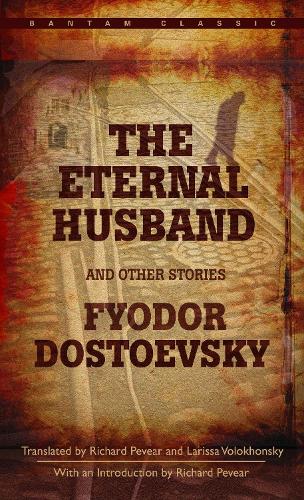
The Eternal Husband and Other Stories
(Paperback)
Available Formats
Publishing Details
The Eternal Husband and Other Stories
By (Author) Fyodor Dostoevsky
Translated by Richard Pevear
Translated by Larissa Volokhonsky
Random House USA Inc
Bantam Books Inc
15th September 2000
5th September 2000
United States
Classifications
Physical Properties
Paperback
384
Width 107mm, Height 171mm, Spine 20mm
210g
Description
The Eternal Husband and Other Stories brings together five of Dostoevsky's short masterpieces rendered into English by two of the most celebrated Dostoevsky translators of our time. Filled with many of the themes and concerns central to his great novels, these short works display the full range of Dostoevsky's genius. The centerpiece of this collection, the short novel The Eternal Husband, describes the almost surreal meeting of a cuckolded widower and his dead wife's lover. Dostoevsky's dark brilliance and satiric vision infuse the other four tales with all-too-human characters, including a government official who shows up uninvited at an underling's wedding to prove his humanity; a self-deceiving narrator who struggles futilely to understand his wife's suicide; and a hack writer who attends a funeral and ends up talking with the dead. The Eternal Husband and Other Stories is sterling Dostoevsky-a collection of emotional power and uncompromising insight into the human condition.
Reviews
One finally gets the musical whole of Dostoevskys original.The New York Times Book Review, on Richard Pevear and Larissa Volokhonskys translation of The Brothers Karamazov
Author Bio
Fyodor Mikailovich Dostoevsky's life was as dark and dramatic as the great novels he wrote. He was born in Moscow in 1821,hroat until he strangled. A short first novel, Poor Folk (1846) brought him instant success, but his writing career was cut short by his arrest for alleged subversion against Tsar Nicholas I in 1849. In prison he was given the "silent treatment" for eight months (guards even wore velvet soled boots) before he was led in front a firing squad. Dressed in a death shroud, he faced an open grave and awaited execution, when suddenly, an order arrived commuting his sentence. He then spent four years at hard labor in a Siberian prison, where he began to suffer from epilepsy, and he returned to St. Petersburg only a full ten years after he had left in chains. His prison experiences coupled with his conversion to a profoundly religious philosophy formed the basis for his great novels. But it was his fortuitous marriage to Anna Snitkina, following a period of utter destitution brought about by his compulsive gambling, that gave Dostoevsky the emotional stability to complete Crime and Punishment (1866), The Idiot (1868-69), The Possessed (1871-72), and The Brothers Karamazov (1879-80). When Dostoevsky died in 1881, he left a legacy of masterworks that influenced the great thinkers and writers of the Western world and immortalized him as a giant among writers of world literature.
